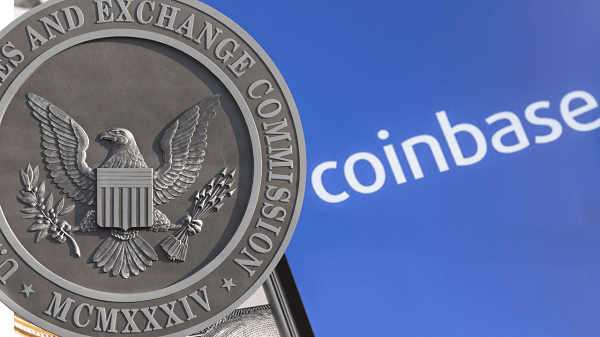Quickly review the SEC’s “only” seven allegations against Coinbase, is hitting your own child light?
Is it appropriate to hit your own child if you find the SEC's seven allegations against Coinbase sufficient?  Compilation | BlockingNews Only one day after filing a civil lawsuit against cryptocurrency exchange Binance, the US Securities and Exchange Commission (SEC) has filed a lawsuit against another cryptocurrency exchange, Coinbase. However, unlike the 13 serious charges against Binance, this time the charges against Coinbase are only 7, and the content of the lawsuit seems “mild”. Let’s take a closer look:
Compilation | BlockingNews Only one day after filing a civil lawsuit against cryptocurrency exchange Binance, the US Securities and Exchange Commission (SEC) has filed a lawsuit against another cryptocurrency exchange, Coinbase. However, unlike the 13 serious charges against Binance, this time the charges against Coinbase are only 7, and the content of the lawsuit seems “mild”. Let’s take a closer look:
1. Coinbase operates a trading platform (“Coinbase Platform”) through which US clients can buy, sell, and trade crypto assets, including crypto asset securities. Coinbase is the largest cryptocurrency asset trading platform in the United States, having served over 108 million customers to date, with daily trading volumes of hundreds of crypto assets totaling billions of dollars on the platform. The Coinbase platform has three functions found in traditional securities markets—brokerage, exchange, and clearing agency—functions that traditional securities markets typically separate. However, Coinbase has never registered with the SEC as a broker, national securities exchange, or clearing agency in the United States, thereby evading the disclosure system established by Congress for the securities market. Coinbase has earned billions of dollars in revenue from investors by charging trading fees, among other ways, but has failed to provide the required disclosure and protection as required by registration, putting investors at significant risk. 2. The Securities Exchange Act of 1934, passed by the US Congress, aims to regulate the national securities market in the United States. The US Congress has instructed the SEC to protect investors, maintain a fair and orderly market, and promote capital formation, and to achieve these objectives through a series of registration, disclosure, record-keeping, inspection, and anti-conflict of interest provisions. These provisions require the separation of critical functions in the securities market—including functions performed by brokers, exchanges, and clearing agencies—in order to protect investors and their assets from the potential conflicts of interest that can arise when these functions are combined.
3. Since at least 2019, Coinbase has played three roles through its platform:
- Operating as an unregistered broker, including soliciting potential investors, handling customer funds and assets, and charging trading fees;
- An unregistered exchange, including providing a market that, in addition to providing trading services, aggregates orders from multiple buyers and sellers of crypto assets and matches and executes these orders;
- An unregistered clearing agency, including holding its customers’ assets in wallets controlled by Coinbase and settling its customers’ trades through debits and credits to relevant accounts.
By integrating these features into a single platform, and without registering any of these three features with the Securities and Exchange Commission in the United States, or qualifying for any applicable registration exemptions, Coinbase has ignored regulatory structures and evaded regulations enacted by Congress and the Securities and Exchange Commission to protect the national securities market and investors.
- U.S. SEC sues Coinbase, alleging violation of U.S. securities rules
- From Static to Dynamic: How NFTs are Changing Digital Ownership?
- What are the differences between the three stablecoin protocols based on Ethereum LST on the market?
4. In addition, during the same period, Coinbase also provided investors with two other operating services as an unregistered broker:
- Coinbase Prime (“Prime”), which allowed Coinbase to act as the digital asset’s main broker, sending orders for cryptocurrency assets to the Coinbase platform or third-party platforms;
- Coinbase Wallet (“Wallet”), which sent orders for cryptocurrency assets to third-party cryptocurrency trading platforms to obtain liquidity outside of the Coinbase platform.
5. Coinbase executed these functions, and the cryptocurrency asset trading provided on Coinbase’s platform, Coinbase Prime, and Coinbase Wallet included cryptocurrency asset securities, making Coinbase’s business entirely within the jurisdiction of securities law. The revenue earned by Coinbase also flowed into its parent company CGI, which is actually Coinbase’s actual controller, so CGI also violated the same trading regulations as Coinbase.
6. Over the years, Coinbase has executed planned and deliberate business decisions to make cryptocurrency assets available for trading to increase its own income, which is mainly based on customer transaction fees, even if the assets provided and sold have “securities” characteristics. At least since 2016, Coinbase has been aware of the relevant tests of the US Supreme Court in the Securities and Exchange Commission v. W.J. Howey Co., 328 U.S. 293 (1946) case and subsequent judgments (Note: Howey Test) to determine whether cryptocurrency assets are part of investment contracts subject to the regulation of securities laws. Moreover, Coinbase has positioned itself as a “compliant” participant in the cryptocurrency asset field, and has used this as part of their public marketing activities. For many years, Coinbase has boasted that it has analyzed cryptocurrency assets according to the standards set by the Howey Test and will only use these cryptocurrency assets for trading if they meet the requirements. However, Coinbase is only paying lip service to complying with applicable laws. The cryptocurrency assets provided on its platform actually belong to investment contracts under the Howey Test and established principles of federal securities law. It can be said that Coinbase values its own interests more than investors’ interests and has not complied with the legal and regulatory frameworks used to protect investors and the US capital and securities markets.
7. Additionally, since 2019, Coinbase has offered and sold a cryptocurrency staking program, allowing investors to earn financial returns by managing assets on certain blockchain protocols through Coinbase. Through the staking program, investors’ cryptocurrency assets are transferred to Coinbase, which pools the assets (as per asset type), then “stakes” (or commits) them in exchange for rewards, which are then proportionally distributed to investors after Coinbase pays a commission of 25-35%.
Investors understand that Coinbase can use its expertise and knowledge to generate returns, and the staking program includes five cryptocurrencies that can be staked. The staking program for these five cryptocurrencies is actually an investment contract, which makes it a security. However, Coinbase has never submitted an offer or sale of its staking program to the U.S. Securities and Exchange Commission (SEC), nor has it issued an effective registration statement, depriving investors of important information about the staking program, harming their interests, and violating the registration provisions of the Securities Act of 1933.
We will continue to update Blocking; if you have any questions or suggestions, please contact us!
Was this article helpful?
93 out of 132 found this helpful
Related articles
- a16z Investments: dydx, Alongside, LayerZero…
- Blockchain game Illuvium to launch NFTs in collaboration with game retailer GameStop, on sale from June 12th.
- Why does the US SEC, which has clearly classified more than a dozen tokens as securities, continue to avoid addressing the status of ETH?
- Hourglass Finance: Providing Comprehensive Infrastructure for Time-Locked Tokens
- Understanding the Pros and Cons of FPGA and GPU Acceleration for Zero-Knowledge Proof Calculation
- Web3 IP: What’s Next?
- Deep analysis of the intent behind SEC’s lawsuit against Binance: a jurisdictional dispute or a show of power?





